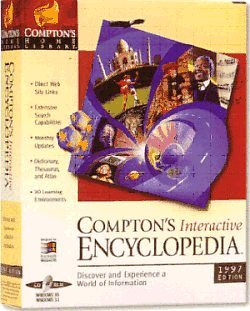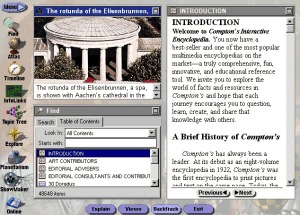
Upping
the Ante
Compton's Interactive
Encyclopedia,
1997 Edition
Compton's Interactive
Encyclopedia was one of the first multimedia entries into this increasingly
crowded field, but it still manages to compete quite well. The 1997 version
of the CD-ROM comes with both Windows 3.1 and 95 capabilities on board.
The encyclopedia is
part of Compton's Home Library, a cornucopia of digital data that includes
a World Atlas, and an interactive cookbook.
It's aimed at people aged from ten years and up and contains more than
40,000 articles and the abundance of photos, videos, animations, and slide
shows one would expect from such a product.
This year, Compton's
has made the search engine more efficient and added some other new features
we'll mention later. It also includes monthly updates, but you'd better
be a subscriber to America Online if you want to take advantage of them.
We tried the disc's search functions to learn about getting the updates
through our normal Internet connection and found it very unhelpful. It
does, however, give you an AOL trial package on the disc, so they're obviously
pushing that online service. Too bad; it should work with any Internet
provider. There are other links, however, that will work with your Internet
service provider. More about them later.
The 1997 encyclopedia
still has Patrick Stewart on board. "Star Trek - The Next Generation's"
Captain Picard isn't popping up all over the place as he has in the previous
couple of versions, but he's on hand during the disc's "Guided Tour."
And as much as we like Stewart, that's enough.
As your online
guide, Stewart takes you by the hand and walks you through the various
features of the encyclopedia. This is done by clicking your mouse on the
"Guided Tour" icon from the menu, which loads the tour. The next thing
you know, there he is, running through this pitch about all the neat things
you can do with Compton's.
Getting Around &
Compton's main
viewing screen (sounds like something from Star Trek, doesn't it?) is
divided into three sections. On the left, next to the menu, are two stacked
windows; to the right is one large window that holds the main articles.
The top screen on the left is the multimedia viewer, where you watch movies
and stills and listen to tunes chosen by clicking on an icon in the "article
viewer," the screen on the right. The third screen is the "Path viewer"
window, which is where you type your search queries, etc.
There are little
pop-down menus you can access from each screen as well, and they look
suspiciously like the ones you find on Encarta. That's fine, they add
an extra little touch of interactivity - and that ain't bad at all.
You can scroll
through articles in the article viewer window using scroll bars or "page
up page down" keys, just like you're probably doing now with this article.
When you come across an icon, like a camera, that means there's a picture
connected with the article. Double clicking on it brings it up in the
multimedia viewer window.
You also get
three choices of installation: minimal (which takes up less than a megabyte
of your precious hard drive space), fast (which takes about 11 meg) and
"really fast" (which means you can kiss goodbye even more space). We chose
the middle installation and found it more than adequate on a Pentium 133
with 32 meg of RAM. 16 Meg is a recommended minimum, though Compton's
says you can get by with 8 if you have to.
It's easy to
find a topic, as long as it's actually there: just type your keywords
into a space in the contents window, hit ENTER and you're off to the races.
Compton's zips to the closest match it can find, and it's generally pretty
good. Our first test was to see if it had a reference to quadraphonic,
the 1970's four channel audio system, and it found it very quickly in
its article on "hi-fi recording."
Our usual test
keyword of "Canada" brought up 1469 references, the top 200 of which were
displayed. There was more stuff about Canada than we cared to know - and
we live there!
And &

Boolean searches
and Advanced Queries let you narrow your searches - and they work very
well. And "plain English" searches let you type in a question and, if
the thing knows the answer, it displays it. We typed in "Who won the 1992
Stanley cup" and were rewarded with more than 2400 hits (including one
that told us Garth Brooks had WON a 1992 Entertainer of the Year award.
Fortunately, the second choice offered was a list of Stanley Cup winners
from 1893 to 1995. We consider that a bingo.
We did a search
for "Big Dipper" and were taken to an article on Ursa Major, which had
a number of Internet URL's at the bottom. A double click on one loaded
our Browser and tried to whisk us to the site. That one didn't work, but
our second attempt did. The way things change in cyberspace these days,
we don't mind it that a link could have moved since the encyclopedia was
pressed. There are hyperlinks spread throughout the disk.
While in the
stellar mood, we tried the new "Planetarium" feature, and it was a hoot.
When you load this, it brings up a screen asking for your location (or
the location for which you want to see the sky). It then loads the sky
as seen from that location, and you can search out stars, constellations,
planets, comets. It's fascinating - and a really nice touch if you're
space cadets. Fortunately, we are!
Space cadets
may also enjoy the "Star Quest" game included on the disk. It's a quiz
that makes you identify and find celestial objects from the window of
your spacecraft. It's entertaining, though we preferred the planetarium.
And Yet Again...
There are lots
of other features to keep you going, too. You get an Atlas that's cross-referenced
with the rest of the disk. Just type in the name of the place for which
you're searching and the atlas takes you there, zooming in on the part
of the world in which your destination resides. It isn't a great Atlas,
but it's better than nothing. A "Timeline" starts 20 billion years ago,
though there isn't much data connected with that particular event. Of
course, there wasn't much media coverage back then, either. The information
gets progressively more detailed as time marches on toward the present
and you can click on the boxes or pictures on the timeline and Compton's
will take you to the appropriate article.
"Topic Tree"
lets you choose a broad subject and narrow in your research. If you double
click on "Technology," for example, you get a second, smaller window in
which you get topics like "Agriculture" "Invention," "Industry," or "Weapons."
From there you can branch further; "Industry" takes you to more specific
industries as you zero in.
Infolinks show
links between articles, ideas, people, and events. For instance "Attila"
brought up a screen that connected articles ranging from "Huns" to "Pope
Leo" to "Byzantine," all surrounded by sub-topics like "Folklore" and
"Storytelling."
Another interesting
feature is Compton's spell corrector. We misspelled "Attila" as "Atilla"
and when the encyclopedia went on its merry search, it offered us other
spelling choices it found. A very nice touch.
There's also
"Showmaker," which lets you assemble your own multimedia presentation
from the different items on the disc, a great feature for students to
use for making reports for school.
Drawing Conclusions &
For its price,
Compton's is a good deal. It has a vast store of information squeezed
onto it and it's easy to navigate. You can copy and paste data into your
other Windows applications and easily find related information or topics
inspired by the ones you've just seen. While it may not be the tool to
use for your thesis, it's a good starting point and can nudge you in the
right direction while saving you some legwork at the beginning.
On the other
hand, the level of its information is probably just fine for what our
schools are passing off as education these days. With its combination
of razzle dazzle and substance, it could help get your kids interested
in learning new things and that alone probably makes it worth its price.
Look at it this way: when the kids ask you a question you can't answer
(and it may happen someday), you can point them to their favourite tool
(the computer) and tell 'em to go nuts.
It may even
encourage the kids to do their homework.
Well, okay,
maybe nothing is good enough to do that...
Compton's
Interactive Encyclopedia is available just about anywhere that sells CD-ROM
software. It's part of Compton's Home Library.
Click here for our review of Encarta and
Encarta Atlas.
Tell us at TechnoFile what YOU think



